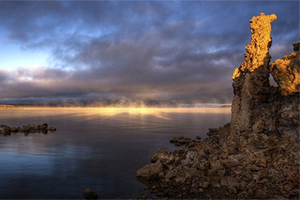Even a century-plus ago, Percival Lowell squinting through the eyepiece of his telescope on Mars Hill thought he saw the signs of life: streaks and lines he perceived on the blurry disk of Mars that he claimed might be canals constructed by a civilization on Mars.
Life on the Moon? While the Apollo program went to the Moon for rocks and glory, they were careful to quarantine their returning astronauts just in case they picked up a Moon bug.
We've been scratching around on Mars since the Viking missions looking for signs (and will soon be scratching some more when the Mars Science Laboratory begins its patrol)—and the sensation created by strange microbe-like rock features in a meteorite from Mars (ALH84001) as possible Martian fossils is an ongoing investigation.
We also study forms of Terrestrial life we call "extremophiles" because of their ability to thrive in extreme heat or cold or toxicity, and we compare those extreme environments to other locations in the solar system that may have similar conditions, looking to those places (especially the watery ones, like Europa and Enceladus and maybe Mars) as possible homes for life.
While I'm waiting for the announcement, I find myself thinking about the possibilities if life is as common in the Universe as some scientists think it might be. Finding other life in our own solar system would be awesome, even if it's fossilized remains of extinct life that we'll never meet microscope-to-photoreceptor.
With evidence suggesting that planets are not only common, but probably far outnumber stars, coupled with profuse examples of Earthly life existing in a vast range of environments, imagine the potential variety of life in the galaxy, or the Universe. Imagine how different, apparently or fundamentally, the spectrum of possible life could be from one end to the other—if that spectrum has ends at all. Imagine how much life might be going on out there right now, maybe even close to home in our stellar neighborhood.
And then imagine, as the SETI Institute has, the possibilities of intelligent life with technological civilizations. How vastly different could they be from our intelligence, and our civilization?
The mind boggles.
Flash! This just in--NASA's big announcement: A bacterium has been found in the arsenic-rich environment of Mono Lake; a microbe that has the ability to substitute arsenic for phosphorous in its biochemistry, phosphorous being one of the essential elements for life as we know it (to which arsenic is toxic). While it is an Earthly microbe, the opening comment of the announcement was that this is NOT life as we have known it. (Funny—NASA's search for life on other planets has been for "life as we know it," and here they find an example of another sort right here on Earth….)
I realize NASA's talking chemistry and not psychic alien embryos that latch onto your spinal column…but this is pretty awesome.
Though it isn't quite the same as the eventual announcement of the discovery of extraterrestrial life (which I can see happening at some point), the ramification of this homeland discovery that most excites me is how it "widens the lens" of our view on possible environments in which we might find life in the Universe.
Life is out there (I expect), and now we have more places to look for it….
37.8148 -122.178
 An alien landscape home to extraterrestrial life? No--it's Mono
An alien landscape home to extraterrestrial life? No--it's Mono